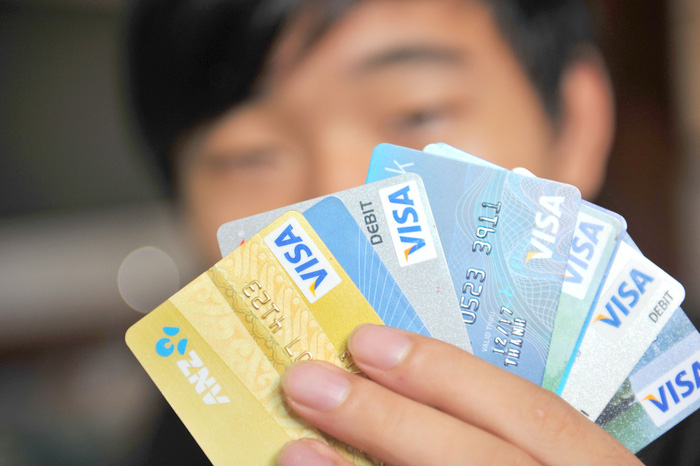Nearly half of all bank cards issued in Vietnam have never been put to use, with experts believing that banks which raced against one other to increase their networks of cardholders are to blame.
As of the end of last year, 132 million bank cards, including debit, credit and other payment cards, had been issued in the Southeast Asian country, but only 77 million of them are now active, according to the Vietnam Bank Card Association.
Fifty-five million of the cards, or 41.7 percent of the total, are consigned to oblivion in the cardholders’ purses and wallets.
According to industry insiders, credit institutions are to blame for the issue, as they apparently run after quantity, rather than real demand from customers, when it comes to issuing payment cards.
The head of the card department at a big bank in Ho Chi Minh City admitted that there has been a race between lenders to boost their numbers of cardholders in recent years, with employees forced to have as many customers register for a bank card as possible.
“The bank first sets a target for its branches, which then assign targets to transaction offices,” he divulged.
“Bank employees therefore have to find ways to have as many customers to apply for a card as they can.”
In order to meet their targets, employees would turn to anyone within their reach, from family members and friends to acquaintances.
“Some also turn to social media sites to find new card customers,” he added.
In addition to individual cardholders, many banks also try to lure companies with attractive incentives to pay their employees through their cards, according to Le Huynh Ha, head of the ATM department at the Ho Chi Minh City branch of Vietcombank.
A company may agree to this offer, enabling the bank to issue as many as 4,000-5,000 debit cards.
“But if that business suddenly decides to switch to another bank, such a huge number of cards will become wasted as employees tend not to continue using the plastic,” Ha explained.
The same situation has been observed with credit card users, according to the Vietnam Bank Card Association.
Many people have been persuaded to register for two to three different credit cards issued by different banks to “earn points from or enjoy promotions for their purchases,” while they do not really have a need for them, according to Dao Minh Tuan, the association’s chairman.
“This results in millions of credit cards that have never been activated, or those activated but having never been used,” he added.
Free does not mean ‘nothing to lose’
With banks requiring no charge and no minimum balance to open a new debit card account, many people have applied for five to seven different cards, believing that they have ‘nothing to lose.'
The reality is that many cardholders had to ‘pay’ for this misconception, according to experts.
T., a resident in Tan Binh District, Ho Chi Minh City, was convinced by a banker to open four cards of different types at one single bank at the same time to receive a return air ticket to Hong Kong as a gift.
“I only used two of them and left the other two cards untouched, thinking that there should be no problem as they were not activated,” she told Tuoi Tre (Youth) newspaper.
However, as she did not read the contract with the issuing bank, T. did not know that both cards would automatically generate annual fees, one year after being issued.
The cardholder was stunned to see that the two cards were subject to annual fees and fines for late payment worth a total of VND1.84 million (US$81).
"I paid the fees, deactivated the cards, and learned a lesson from this,” she said.
Tran Quang Thoai, a local bankcard specialist, suggested that credit institutions only take into consideration payment cards that have been activated and really used when calculating if their targets of increasing the number of cardholders are met.
This means there is no ‘mission accomplished’ for a branch that manages to issue 1,000 new cards as targeted, if only a certain proportion of them are put to use.
“Banks should contact customers whose cards have been left unused for a while to learn about their needs,” Thoai suggested.
The specialist added that regulators should also take measures to make banks report about their payment card customers more accurately and thoroughly.
Like us on Facebook or follow us on Twitter to get the latest news about Vietnam!




















































